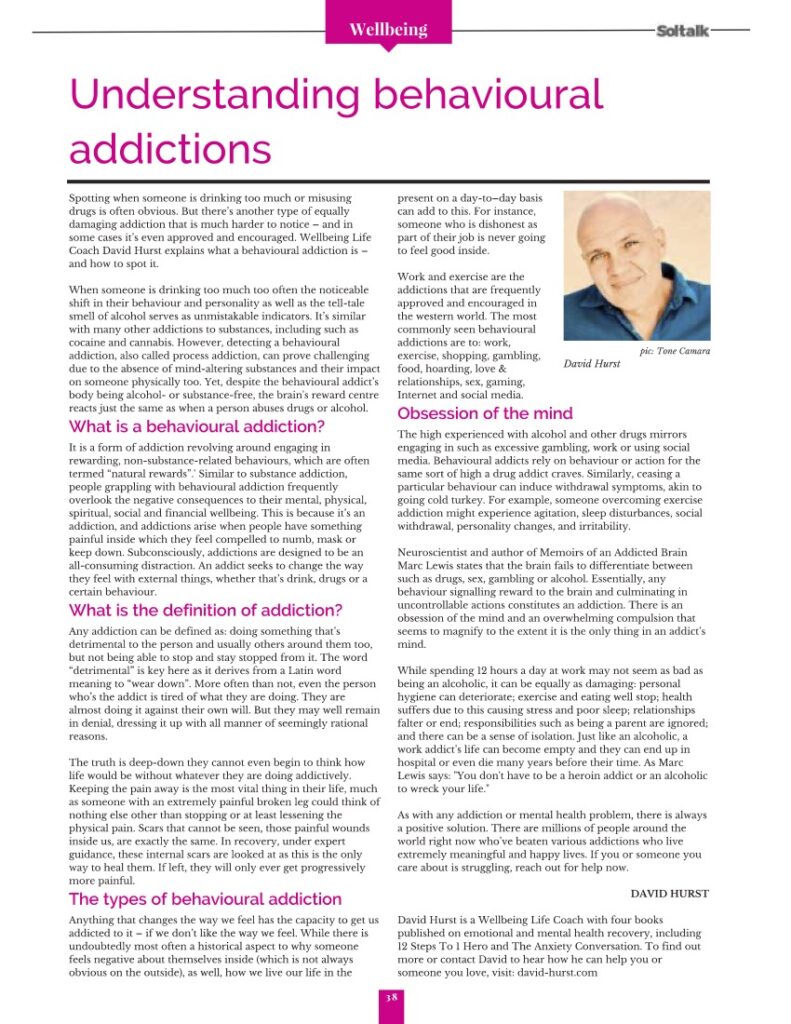Understanding behavioural addictions

Spotting when someone is drinking too much or misusing drugs is often obvious. But there’s another type of equally damaging addiction that is much harder to notice – and in some cases it’s even approved and encouraged. So what is a behavioural addiction is – and how do you spot it?
When someone is drinking too much too often the noticeable shift in their behaviour and personality as well as the tell-tale smell of alcohol serves as unmistakable indicators. It’s similar with many other addictions to substances, including such as cocaine and cannabis.
However, detecting a behavioural addiction, also called process addiction, can prove challenging due to the absence of mind-altering substances and their impact on someone physically too. Yet, despite the behavioural addict’s body being alcohol- or substance-free, the brain’s reward centre reacts just the same as when a person abuses drugs or alcohol.
What is a behavioural addiction?
It is a form of addiction revolving around engaging in rewarding, non-substance-related behaviours, which are often termed “natural rewards”.’ Similar to substance addiction, people grappling with behavioural addiction frequently overlook the negative consequences to their mental, physical, spiritual, social and financial wellbeing.
This is because it’s an addiction, and addictions arise when people have something painful inside which they feel compelled to numb, mask or keep down. Subconsciously, addictions are designed to be an all-consuming distraction. An addict seeks to change the way they feel with external things, whether that’s drink, drugs or a certain behaviour.
What is the definition of addiction?
Any addiction can be defined as: doing something that’s detrimental to the person and usually others around them too, but not being able to stop and stay stopped from it. The word “detrimental” is key here as it derives from a Latin word meaning to “wear down”. More often than not, even the person who’s the addict is tired of what they are doing.
It is almost as if they keep doing it against their own will. But they may well remain in denial, dressing it up with all manner of seemingly rational reasons.
The truth is deep-down they cannot even begin to think how life would be without whatever they are doing addictively. Keeping the pain away is the most vital thing in their life, much as someone with an extremely painful broken leg could think of nothing else other than stopping or at least lessening the physical pain.
Scars that cannot be seen, those painful wounds inside us, are exactly the same. In recovery, under expert guidance, these internal scars are looked at as this is the only way to heal them. If left, they will only ever get progressively more painful.
What are the types of behavioural addiction?
Anything that changes the way we feel has the capacity to get us addicted to it – if we don’t like the way we feel. While there is undoubtedly most often a historical aspect to why someone feels negative about themselves inside (which is not always obvious on the outside), as well, how we live our life in the present on a day-to–day basis can add to this. For instance, someone who is dishonest as part of their job is never going to feel good inside.
Work and exercise are the addictions that are frequently approved and encouraged in the western world. The most commonly seen behavioural addictions are to:
· Work
· Exercise
· Shopping
· Gambling
· Food
· Hoarding
· Love & relationships
· Sex
· Gaming
· Internet
· Social media
Obsession of the mind
The high experienced with alcohol and other drugs mirrors engaging in such as excessive gambling, work or using social media. Behavioural addicts rely on behaviour or action for the same sort of high a drug addict craves.
Similarly, ceasing a particular behaviour can induce withdrawal symptoms, akin to going cold turkey. For example, someone overcoming exercise addiction might experience agitation, sleep disturbances, social withdrawal, personality changes, and irritability.
Neuroscientist and author of Memoirs of an Addicted Brain Marc Lewis states that the brain fails to differentiate between such as drugs, sex, gambling or alcohol. Essentially, any behaviour signalling reward to the brain and culminating in uncontrollable actions constitutes an addiction.
There is an obsession of the mind and an overwhelming compulsion – that seems to magnify to the extent it is the only thing in an addict’s mind.
While spending 12 hours a day at work may not seem as bad as being an alcoholic, it can be equally as damaging: personal hygiene can deteriorate; exercise and eating well stop; health suffers due to this and such as stress and poor sleep; relationships falter or end; responsibilities such as being a parent are ignored; and there can be a sense of isolation.
Just like an alcoholic, a work addict’s life can become empty and they can end up in hospital or even die many years before their time. As Marc Lewis says: “You don’t have to be a heroin addict or an alcoholic to wreck your life.”
As with any addiction or mental health problem, there is always a positive solution. There are millions of people around the world right now who’ve beaten various addictions who live extremely meaningful and happy lives. If you or someone you care about is struggling, reach out for help now.

My latest article for Soltalk magazine.
